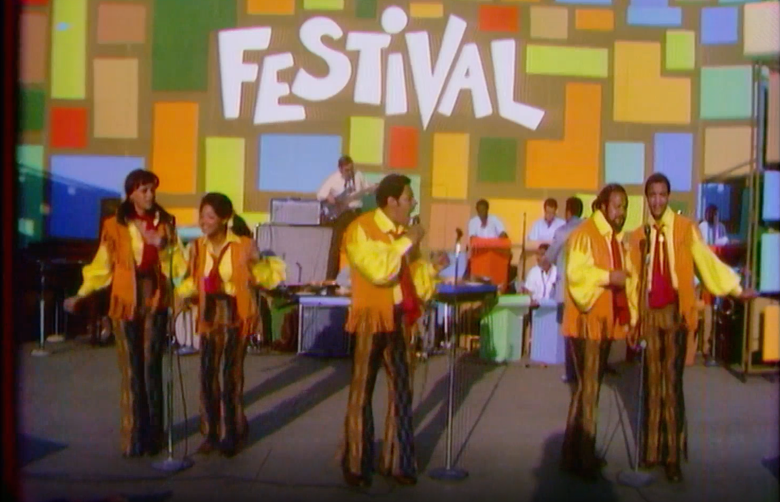Summer of Soul (… or, When the Revolution Could Not Be Televised) – An alternative Woodstock | BIDFF
We all know Woodstock: we have a more or less concrete image of those who sang on its fields, we are familiar with the human swarm that, during those three legendary days, conquered every single free patch of grass, and we have often assimilated the values that were promoted there. A smaller number of us have also heard about Altamont – the anti-Woodstock that, at least at a symbolic level, pretty much put an end to the days of hippieness and happiness –, whether because we might be interested in the roots of counterculture, or because we are cinephiles and have seen that Maysles Brothers’ mythical documentary, Gimme Shelter, which covers an equally mythical concert by The Rolling Stones. But how many of us have the same amount of documentary coverage of a similar event called The Harlem Cultural Festival, which due to a series of complex motivations, ended up being swallowed in time? For us, all these ignorants who feel that things have remained in a thankless state of suspension and that they must urgently be recovered, a documentary like Summer of Soul, directed by musician Questlove, will serve as an ideal introduction to the topic’s hardened skin. And for others, who rightfully consider The Harlem Cultural Festival to be a nodal point in the struggle for the emancipation of people of color, the film will serve as a way to make amends, a confirmation, a necklace onto which memories of happiness are strung like pearls.
The Harlem Cultural Festival was hosted in a park in New York during the same summer of 1969 in which the Woodstock festival, youth, sexuality, and politics were allegedly shaking society free of entire centuries of repression, hypocrisy, and other such moral defects. In front of the stage that was set in Harlem – we see from the cleanly digitized images of the film – a massive crowd of people had gathered, which had no reason to envy the proto-hipsters of Woodstock: even there, in New York, things were as serious as they could get. After all, a musical documentary is only good if, tautologically, it preoccupies itself with music, taking upon itself to set aside gossip, biographies, and anecdotes for a later time. In this case, we are lucky: again and again, Questlove uses the screen to interweave footage of the day’s performers – from heavyweights (such as Stevie Wonder or Nina Simone) to progressive gospel choirs that had set their feet strongly in the most secular musical tradition imaginable – to footage of the audience that had come to participate in the manifestation for free. These are honest images – their framing is simple and lacking in esoteric quests –, which translate to an even more honest happiness of experiencing the feeling of belonging. The film’s essence plays between these interchanges and its returns to music, seen here both – and, lacking in any hierarchy between the two – as a perfect chance to escape, as an invitation within the community, and as a battle cry. Over these images floats the political vector of the uprising community – but the film doesn’t do any post-festum manipulations to that effect, since this vector was already a certainty by then.

Summer of Soul is, as such, a rigorous recap of a moment that was capable of producing a concentrated experience, to the same degree to which it sketches, in increasingly large circles, a portrait of an America and of a world which are on the verge of tilting towards a more articulate, welcoming and sharp version of themselves. But, as much as these images constitute a sort of celebration of black culture – “Young, Gifted and Black” being the title of a song that is stirringly performed by Nina Simone –, to the same degree, they also represent an update to the long-lasting racism that is still making its rounds through society to this very day. What else could be suggested by the fact that, in contrast to Woodstock, and even the degenerate Altamont, the (audio-visual) memory of this festival ended up rotting in a storehouse for half a century? As if the festival had played a minor, anecdotal part, and not the majestic role of bringing together the common destiny of an entire segment of the population. Hence the slightly bombastic (if you ask me) title of When the Revolution Could Not Be Televised, which suggests that these images didn’t screen anywhere because, in the end, the higher powers didn’t want this to happen.
Of course, one could accuse Questlove of the fact that he settled for a format that is a tad too conventional, in which “talking head”-style interviews come to give explanations, to supplement, to comment on the natural gaps within the images. Summer of Soul will not provoke any sort of cinephile epiphanies – but the endeavor that lies at its basis, that of bringing attention back to a forgotten event, together with all of its promises (a fairer and more inclusive world), which now seem to be regressing all over the world, is more than welcome. These images arrive at us with a delay, but they are finally making their way to us. And they must be seen, beyond the musical liberation that they entail, in order to once more get a taste of the authentic utopia, of its loudly affirmed ideal, of the possibility to gather around the same pressing matters.
Summer of Soul was the closing film of the Bucharest International Dance Film Festival.
Title
Summer of Soul (... or, When the Revolution Could Not Be Televised)
Director/ Screenwriter
Questlove
Country
USA
Year
2020
Film critic and journalist; writes regularly for Dilema Veche and Scena9. Doing a MA film theory programme in Paris.


